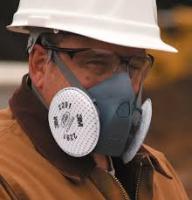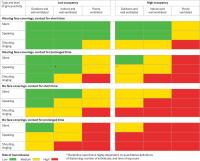In the great mask debate, I've said more than once I avoid people who are talking with loose fitting masks more than I avoid silent mask-less people. I came to this belief after reading an article on MedScape from Jose-Luis Jimenez, PhD, who argued back in July that aerosols were the primary mode of contagion, & vocalizing a primary generator of aerosols. (see attached pdf).
Early on, the emphasis was on droplets (cough/sneeze) & surfaces, but the boffins are now saying fooey on fomites (surfaces), and aerosol transmission has moved to the forefront as a primary mode of contagion. There is also a lot of new emphasis on the size of the initial inoculum, and aerosol that is inhaled deep into the lungs or limited to the upper respiratory tract, and severity of disease. While we normally breath through our nose while silent, when we're talking, oral inhalation is the norm.
While scientists have measured live virus in the condensate of normal (silent) respiration, apparently this pales in comparison to what occurs when vocal cords, wet with saliva are vibrating rapidly while air is being forced through them. Fine aerosols are also far more likely to escape from masks (particularly with gaps) and inhaled more deeply into the lungs than droplets, which are likely to hit nasal/oral surfaces during inhalation, resulting in a milder infection.
I feel it is important to have a thread on this, even if it doesn't get much traffic, as what I see out in public is very concerning. People are chattering away, while standing quite close, often with very loose fitting masks, and family members are visiting each other in their homes, talking the whole time with no masks at all.
This story caught my eye today: https://www.business...-so-much-2020-9
A 30-minute conversation may spread COVID-19 more easily than sharing a bedroom. Here's why quiet is a key virus-fighting strategy.
"A new study conducted in Singapore found that 30 minute conversations may even spread the coronavirus more than sharing a bedroom with a sick patient."
It's a fairly long read, much like the pdf I attached from MedScape, but those who really wish to avoid getting this virus (particularly a deep pulmonary infection) might wish to adjust how they are evaluating potential for contagion in their interactions with others. I'm all for masks. Worked as a Surgical Technologist for 35 years, masked all day, but a loose fitting reusable mask with stretched out ear-bands that hangs open at the top is hardly a mask at all. Please spend a little time on the pdf & linked story, and adjust your defenses accordingly.
Attached Files
Edited by Dorian Grey, 04 November 2020 - 04:09 AM.






















































